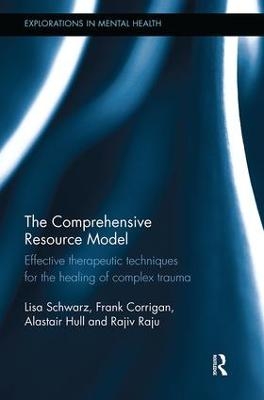
The Comprehensive Resource Model
Routledge (Verlag)
978-1-138-57972-9 (ISBN)
Traditional methods employed in psychotherapy have limited effectiveness when it comes to healing the psychological effects of trauma, in particular, complex trauma. While a client may seem to make significant breakthroughs in understanding their feelings and experiences on a rational level by talking with a therapist, this will make no difference to their post-traumatic symptoms if the midbrain is unable to modulate its activity in response. The Comprehensive Resource Model argues for a novel therapeutic approach, which uniquely bridges neuroscience and spirituality through a combination of somatic therapy, traditional psychotherapy, and indigenous healing concepts to provide effective relief to survivors of trauma.
The Comprehensive Resource Model was developed in response to the need for a streamlined, integrative therapeutic model; one which engages a scaffolding of neurobiological resources in many brain structures simultaneously in order for clients to be fully embodied and conscious in the present moment while processing their traumatic material. All three phases of trauma therapy: resourcing, processing, and integration are done simultaneously. Demonstrating a nested model and employing brain and body-based physiological safety as the foundation of healing, chapters describe three primary categories of targeted processing: implicit and explicit survival terror, ‘Little T Truths’, and ‘Big T Truths’, all of which contribute to thorough healing of complex trauma and an expansion into higher states of consciousness and embodiment of the essential core self.
This book describes the development and benefits of this pioneering new approach to trauma therapy. As such, it will be of key interest to academics, researchers and postgraduate students in the fields of psychiatry, psychotherapy, psychology and trauma studies. It will also appeal to practising therapists, psychiatrists, psychologists, psychiatric nurses, and to others involved in the treatment or management of patients with complex trauma disorders.
Lisa Schwarz is a psychologist, consultant and international educator working in private practice in Pittsburgh, Pennsylvania, USA. Frank Corrigan is a psychiatrist working in Argyll and Glasgow, UK, specialising in the treatment of psychological trauma. Alastair Hull is a psychiatrist and psychotherapist working in Tayside , UK, specialising in the treatment of psychological trauma. Rajiv Raju is a full time specialist in psychiatry working at the Argyll and Bute Hospital, Scotland, UK; currently he is on a leave of absence.
1. Introduction 2. Overview of the model 3. The Challenges of Trauma 4. Frozen Breath 5. Stepping into the affect 6. Cutting off the pain and terror 7. Re-membering, re-experiencing, re-processing, re-orienting, re-consolidating and re-newing 8. Attunement 9. Breathing 10. Sacred Place 11. Resource Grids 12. Attachment Resources 13. Distress 14. The Core Self in CRM: clinical aspects 15. The Core Self in CRM: theoretical aspects 16. Personal Power Animals as resources for healing 17. Secondary Resources and Additional Protocols 18. Blocks to Healing 19. New Truths and Session Closure 20. Application of CRM to the treatment of Dissociative Identity Disorder 21. Conclusion
| Erscheinungsdatum | 13.06.2018 |
|---|---|
| Reihe/Serie | Explorations in Mental Health |
| Zusatzinfo | 1 Line drawings, black and white |
| Verlagsort | London |
| Sprache | englisch |
| Maße | 156 x 234 mm |
| Gewicht | 326 g |
| Themenwelt | Medizin / Pharmazie ► Medizinische Fachgebiete ► Psychiatrie / Psychotherapie |
| ISBN-10 | 1-138-57972-6 / 1138579726 |
| ISBN-13 | 978-1-138-57972-9 / 9781138579729 |
| Zustand | Neuware |
| Informationen gemäß Produktsicherheitsverordnung (GPSR) | |
| Haben Sie eine Frage zum Produkt? |
aus dem Bereich


